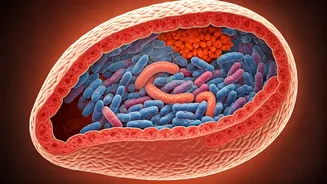The Gut-Brain Axis
The gut-brain axis is a complex communication network that connects your gut and brain, acting as a two-way street for information transfer. This intricate
system employs neural, immune, and hormonal pathways to facilitate the constant flow of signals between the gut and the brain. The gut microbiome, consisting of trillions of bacteria, plays a significant role in this communication. These bacteria can influence brain function, behavior, and mood by producing neurotransmitters, regulating inflammation, and impacting the permeability of the gut lining. Dysbiosis, or an imbalance in the gut bacteria, has been observed in individuals with depression, where there may be fewer beneficial bacteria and a greater presence of inflammatory microbes. This imbalance can disrupt the gut-brain axis, potentially affecting mood and mental health. Understanding this connection underscores the importance of maintaining a healthy gut environment for overall well-being, as it is a crucial element for a balanced mind.
Dysbiosis and Depression
An imbalance in gut bacteria, known as dysbiosis, is a noticeable phenomenon in individuals experiencing depression. This imbalance is characterized by a reduction in beneficial bacteria alongside an increase in inflammatory microbes within the gut. This shift can significantly impact mental health. The presence of fewer beneficial bacteria, which are crucial for producing essential nutrients and regulating immune responses, can contribute to mood disturbances. At the same time, an abundance of inflammatory microbes can trigger chronic inflammation throughout the body. Chronic inflammation is known to contribute to depressive symptoms. This inflammation can damage the gut lining and disrupt the delicate balance of the gut-brain axis, further affecting mood and mental health. This connection highlights the importance of maintaining a balanced gut microbiome, which is crucial for overall well-being and the prevention of depressive episodes. Identifying and addressing dysbiosis may offer a pathway to improved mental health outcomes for those struggling with depression.
Lifestyle's Impact on Mood
Lifestyle factors play a pivotal role in shaping the composition of gut bacteria and, by extension, influencing mood and mental health. Poor dietary habits, characterized by a lack of fiber and a high intake of processed foods, can starve beneficial gut bacteria and promote the growth of harmful ones. Insufficient sleep can disrupt the natural rhythms of the gut and exacerbate inflammation. High stress levels can lead to the release of stress hormones, which can disrupt the gut microbiome and impair the gut-brain axis communication. The use of antibiotics, while necessary for treating infections, can also inadvertently kill off both beneficial and harmful gut bacteria, potentially leading to dysbiosis. The cumulative effects of these lifestyle factors can result in an imbalanced gut microbiome, which, in turn, may contribute to mood disorders and mental health challenges. Taking measures to improve these factors can significantly benefit your gut microbiome and, as a result, your mood.
Signs of Imbalance
Recognizing the subtle signs that your gut-brain connection may be off-kilter can be crucial for addressing potential issues early. Longer-term digestive issues, such as bloating, constipation, or diarrhea, are common indicators of gut dysfunction. Sluggish mood, characterized by persistent feelings of sadness, low energy, or lack of interest, can also be a sign of an imbalanced gut. Brain fog, leading to difficulties in concentration, memory, and clear thinking, may be linked to gut health. Unusual cravings, especially for sugary or processed foods, can signal imbalances in the gut bacteria. Sleep issues, including insomnia or disrupted sleep patterns, can be associated with poor gut health, as the gut microbiome plays a role in regulating sleep-wake cycles. If you experience these symptoms, it's worth considering your gut health as a contributing factor. Addressing these issues might help reduce the impact and improve overall well-being, potentially benefiting both gut health and mental health.
Inflammation: The Common Thread
When harmful microbes overpopulate the gut, they may trigger increased intestinal permeability, often referred to as 'leaky gut,' where the intestinal barrier becomes compromised, allowing substances to seep into the bloodstream. This breach can trigger immune responses and systemic inflammation throughout the body. Chronic inflammation is increasingly recognized as a significant contributor to depression and other mental health disorders. The inflammatory response can disrupt the delicate balance of neurotransmitters in the brain, impacting mood and cognitive function. Moreover, inflammation can impair the gut-brain axis. Recognizing the link between inflammation and mental health is vital, as it highlights the need for strategies that reduce inflammation. This includes dietary adjustments, stress management techniques, and potentially, targeted interventions to promote a healthy gut microbiome.
Improving Mood with Gut Health
Early research suggests that manipulating the gut microbiome may lead to improvements in mood and a reduction in depressive symptoms. Prebiotics, which are non-digestible fibers that feed beneficial gut bacteria, can promote a healthier gut environment. Probiotics, live microorganisms that offer health benefits when consumed, can help restore balance to the gut microbiome. Dietary changes, such as increasing fiber intake and reducing processed foods, can support the growth of beneficial bacteria. While more large-scale studies are needed to fully understand the effects of these interventions, the early evidence is promising. It is advisable to consult a healthcare professional before implementing any gut-focused strategies to ensure they are appropriate for your individual needs. The ongoing research in this area continues to deepen our understanding of the complex connection between the gut and mental well-being.















